
P-ISSN 1859-3585 E-ISSN 2615-9619 https://jst-haui.vn ECONOMICS - SOCIETY Vol. 60 - No. 11E (Nov 2024) HaUI Journal of Science and Technology
105
REGRESSION MODELS FOR DETERMINING FOREIGN OWNERSHIP RATIO IN VIETNAMESE LISTED FIRMS: THE ROLE OF ENVIRONMENTAL, SOCIAL, AND GOVERNANCE (ESG) SCORES
Vu Hoang Minh1,*, Nguyen Duc Huy2, Nguyen Viet Thanh1 DOI: http://doi.org/10.57001/huih5804.2024.349 ABSTRACT
This paper proposes regression models to investigate the impact of ESG
scores and other factors on foreign ownership in Vietnamese listed firms. ESG
scores, as a valuable tool for measuring a firm's environmental, social, and
governance performance, provid
e foreign investors with insights into
investment risks and potential, enabling them to determine optimal
ownership levels for maximising returns. This study contributes to the
growing body of research on the role of ESG scores in foreign ownership by
deve
loping models to explore the relationship between ESG scores, other
relevant factors, and foreign ownership. The authors address the endogeneity
issue between firm-specific control variables and ESG scores using a 2SLS-
IV
approach. Our proposed models serv
e as a foundation and reference point for
future research examining the influence of ESG scores and other factors on
foreign ownership in Vietnamese listed firms. Keywords:
Foreign ownership, Vietnamese listed firms, environmental,
social, governance, ESG.
1National Economics University, Vietnam 2Electric Power University, Vietnam *Email: minhvuhoang88@gmail.com Received: 05/5/2024 Revised: 15/7/2024 Accepted: 28/11/2024 1. INTRODUCTION In recent years, foreign investors have actively participated in frontier and emerging stock markets, including Vietnam's. In 2023, the net capital withdrawal of foreign investors reached a record level of more than 1 billion USD, although the market indices VN-Index and VN30 both recorded an increase in 2022 [38]. After 8 consecutive weeks of net selling in the last months, foreign capital flow returned with a net buying value of more than 300 billion VND in the last week of the year [31]. The reason for this concern is that the year 2023 was forecasted to witness many uncertainties in the world's macroeconomic situation, as well as interest rates in the US remain high for a long time, creating pressure to force foreign investors to withdraw capital from Southeast Asian countries like Vietnam in search of safer investment channels [26]. Currently, the pressure to withdraw net capital from foreign investors is increasing rapidly due to fluctuations in currency exchange rates, causing this group to restructure their investment portfolios and adjust cash flows. In the first three months of 2024, foreign investors only net bought in January with a value of nearly 178 billion VND - the lowest level in the past 7 years, and continued to net sell in February and March [75]. In the first quarter of 2024, the State Bank of Vietnam actively regulated the market through continuous net capital withdrawals from the T-bill channel, to slow down the increase in domestic exchange rates and narrow the exchange rate gap between VND and USD [34]. This trend continues until the end of May 2024, when foreign investors have sold a net of 1.6 billion USD, exceeding the whole year 2023. However, experts are still optimistic about future scenarios, with the expectation that the US Federal Reserve Bank will reduce interest rates for the third time this year, helping to reduce the devaluation pressure of the Vietnamese currency (VND). In addition, positive macroeconomic factors such as trade growth, stable foreign exchange reserves and tourism recovery

ECONOMICS - SOCIETY https://jst-haui.vn HaUI Journal of Science and Technology Vol. 60 - No. 11E (Nov 2024)
106
P
-
ISSN 1859
-
3585
E
-
ISSN 2615
-
961
9
are also expected to support the market [44]. Another factor receiving attention is the goal of upgrading Vietnam's stock market from "marginal" to "emerging" in the second half of 2025, which brings many positive signals. Faced with a positive future scenario, the Vietnam government expects large capital flows from financial institutions around the world to flow into the Vietnamese market to anticipate investment opportunities. This reflects investors' confidence in Vietnam's economic and financial market prospects in the future [15]. Recently, Vietnamese firms had increasingly paid attention to the Environmental, Social, and Governance - ESG scores to promote sustainable development and improve business performance [65]. In Vietnam, the government has made strong commitments to promoting ESG. A typical example is the "Vietnam ESG Initiative 2024" [78], aiming to promote private firms to do sustainable business and implement ESG practices to measure sustainable development and impact on the community. However, to fully exploit the potential that ESG brings, it is necessary to attach this concept to the organization's strategy and improve the business model of the firm, because currently, Vietnam has only 35% of listed firms have established ESG plans, the reason being that senior leaders have not played a leading role and implemented the business's ESG initiatives [66]. In addition, corporate communication on ESG compliance has not been carried out effectively, with 70% of firms having no or very limited ESG reports [67]. Concluding with the PwC report, KPMG's report also shows that the disclosure of ESG practices in Vietnamese firms is increasingly popular, but the quality of reporting is still not up to standard [46]. Many companies lack professional knowledge and struggle to highlight information, making it impossible to attract international investors. Even so, government and business efforts to promote ESG have created positive signals. The Vietnamese government supports businesses through ESG policies and training programs, helping to improve competitiveness and meet the requirements of international investors as Vietnam integrates deeply into the global supply chain [1]. Moreover, the Corporate Social Responsibility index is becoming increasingly important for long-term sustainable development. In Vietnam, firms' CSR index has received more attention after incidents causing environmental damage caused by factories, such as the incident at the Formosa factory in Vietnam in 2016 [77]. Thanks to the impetus from government policies and increased public awareness from international investors, perfecting CSR metrics in Vietnam has developed rapidly, accelerating the process of international integration to achieve the goal of becoming a high-income developed country. Currently, multinational and domestic firms in Vietnam have paid more attention to CSR metrics [64]. However, this is still a big challenge for pioneering firms when having to build habits and culture towards the goal of sustainable development [64, 67]. Building ESG strategies or CSR increases the attractiveness of a business to international investors interested in sustainability factors [7, 8, 20]. This is also a key strategy to attract long-term investors, successfully integrate internationally, increase access to new capital sources, as well as improve relationships with business partners [11, 48, 71]. Therefore, with the global movement towards sustainable development, many studies on the connection between corporate ESG practices and foreign investor ownership have been conducted such as by Yu [91], Zhang et al. [92] and Addison [3]. The authors have discovered authors’ argument and their theoretical basis on the impacts of ESG scores on the investment activities of foreign investors: The impact of ESG compliance issues on the foreign ownership ratio [43, 88]. The relationship between foreign investors' shareholdings and listed firms' ESG-compliant business activities [3, 63]. The impact of ESG reports on foreign investors' stock holdings [11, 43, 91]. An overview of related studies will be presented in detail in section 2. Increasing the confidence of foreign investors and building corporate image through implementing environmental, social, and governance (ESG) strategies is extremely important for firms in Vietnam. Therefore, the authors sought to understand the theoretical and practical basis of the relationship between ESG scores and the foreign ownership ratio. On that basis, the authors proposed an estimation model to evaluate the impacts of ESG scores on the foreign ownership ratio in listed firms on the Vietnam stock exchange. 2. LITERATURE REVIEW AND HYPOTHESIS DEVELOPMENT 2.1. Literature Review Definitions The concept of foreign ownership is defined as the right to hold part of assets such as businesses, natural resources, financial assets, bonds, equity, and securities in

P-ISSN 1859-3585 E-ISSN 2615-9619 https://jst-haui.vn ECONOMICS - SOCIETY Vol. 60 - No. 11E (Nov 2024) HaUI Journal of Science and Technology
107
a country by individuals who are not citizens of that country or by firms whose headquarters are not located in that country [36]. Foreign ownership is common in the modern economy and is associated with the process of global integration. Regarding foreign ownership, the most common investment method is foreign portfolio investment (FPI), which is defined as foreign equity investment represented by the proportion of the firm's shares held by foreign investors [43] This ratio is calculated as a percentage of shares held by foreign investors in firms listed on the Vietnam stock market. The maximum holding ratio is regulated differently in different business sectors [6, 93]. In general, the foreign ownership ratio is the ratio of stock ownership by foreign investors compared to the total number of shares outstanding on the stock market of a firm [59]. In Vietnam, foreign investors can only buy securities after registering through a licensed domestic securities firm, which acts as a custodian. Many factors affect the foreign ownership ratio, as well as their stock market trading moves [58, 60]. They often prioritize choosing firms with large market capitalization, high liquidity, high profits, high leverage and high book value per share ratio, but low financial leverage and low ownership concentration [51, 52, 60, 87]. A firm that has high liquidity reflects good short-term financial health and is very attractive to foreign investors [86]. They are also attracted by low debt-to-equity ratio, high-profit volatility and price volatility [17]. The foreign ownership ratio in a firm reflects investment preferences and attractiveness to foreign investors. They do not intend to invest in firms when the stock price is overvalued compared to the actual value [12]. In addition, investors tend to choose to invest in firms they are familiar with and have little information asymmetry [86]. But in a state of little information, they analyze stock returns better than domestic investors [10]. Accordingly, the study of Badawi et al. [9] has shown that domestic investors have lower investment efficiency than foreign investors. Each country has its laws regulating the foreign ownership ratio. For example, in Indonesia, according to current capital market laws, foreign individuals and legal entities are allowed to buy and sell all types of securities, and investors can own 100% of the shares of a registered listed firm and 99% of shares in the banking industry. Taxed profits for domestic investors is 10%, foreign investors are 20%, and capital income is all at 0.15% [86]. In Taiwan, capital gains are tax-free while income gains are taxed as ordinary income for domestic investors, but foreign investors will be taxed at 25% on retained profits [52]. In the Vietnam stock market, there are restrictions on the ownership of foreign investors. The newest update in Decree No. 01/2014/ND-CP and Clause 1, Article 77 of the Securities Law 2019 stated that the maximum foreign ownership ratio is 30% of commercial banks and 49% of other firms. The reason is that Vietnam's economy depends heavily on the banking system, so it is not possible to raise the ownership limit for foreign investors, but the authorities are continuing to raise the ownership limit of foreign investors [12, 84]. Setting such a limit in Vietnam cannot well meet the share ownership needs of foreign investors, because they have great financial capacity but are limited when investing in Vietnamese firms. Currently, Vietnam is continuing to accelerate the equitization process [81]. Raising the ownership ratio for foreign investors is essential to take advantage of their experience in management, capital and technology. However, current ownership limits in Vietnam have limited the liquidity of stocks, thereby reducing the ability of domestic firms to mobilize capital. Regarding ESG (Environmental, Social, Governance), this term appeared in the second half of the 20th century, in environmental protection movements such as Carson [18], Ngo [57] and Dangermond [24]. Firms around the world are required to take specific responsibility for business activities that affect the environment and human living conditions. The term ESG officially appeared for the first time in a United Nations report, when the organization guided and recommended how to integrate environmental, social, and corporate governance issues in asset management and related brokerage services [80]. ESG is evaluated through three main groups of factors including environment, society and corporate governance [92]. First, the group of environmental factors evaluates the overall impact of firms and businesses on the environment and how to manage risks when facing environmental problems such as climate change, pollution, and measures to protect natural resources. ESG criteria across the environmental group include energy consumption and efficiency, waste management, air and water pollution levels, biodiversity conservation and natural resource use [54, 70]. The second group of social factors, which are difficult to measure because they relate to people, including regulations on diversity, inclusion, equality, health and

ECONOMICS - SOCIETY https://jst-haui.vn HaUI Journal of Science and Technology Vol. 60 - No. 11E (Nov 2024)
108
P
-
ISSN 1859
-
3585
E
-
ISSN 2615
-
961
9
social safety [56]. Firms treat their employee base, investors, customers and stakeholders, with several specific social ESG criteria such as employee pay; diversity, equity and inclusion programs; employee engagement experiences, workplace health and safety, data protection and privacy policies, fair treatment of customers and suppliers, customer satisfaction, community relations, funding projects to help the poor, human rights and labor standards [35, 54]. The third group of governance factors includes testing the firm's ability to self-manage policies, internal governance and maintain compliance with firm regulations. Some factors that evaluate this group include leadership and firm management; board composition, compensation policies, financial transparency and business integrity, compliance initiatives and risk management; ethical business practices, regulations on issues of corruption, bribery, and conflicts of interest [70]. Many organizations provide effective ESG assessment standards such as the International Organization for Standardization (ISO) such as [39-41]; International Sustainability Standards Board (ISSB), Global Reporting Initiative (GRI), Task Force on Climate-Related Financial Disclosure (TCFD). In Vietnam, there is a set of indicators called the Corporate Sustainability Index (CSI) provided by the Vietnam Chamber of Commerce and Industry (VCCI) to evaluate the ESG factors of a firm [83]. This set of indexes is adjusted appropriately according to Vietnam's legal policy in 2023, with 2 evaluation categories, including Business Overview and ESG Scale Evaluation Index [83]. In particular, the Business Overview section provides an overview of business information, economic-social-environmental information, structure, organizational model and key personnel. Next, the Scale Evaluation Index section is presented in detail with four subsections, including evaluation results in the last three years on the environment, labor - society and corporate governance [76]. These index sets include 130 indexes and are divided into 2 levels: 82 basic indexes C (Core) and 48 advanced indexes A (Advance) [83]. Basic index C are indicators of legal compliance and firms must perfect these indicators based on the nature of production and business industries (accounting for about 63% of the indicators). Advanced index A evaluates whether a business has been building a healthy business ecosystem to ensure long-term, sustainable benefits for partners and stakeholders, accounting for the remaining 37% [85]. The detailed scale has been described in the CSI profile published by VCCI [83]. Regarding the concept of Corporate Social Responsibility (CSR), along with the task of maximizing profits, firms must consider social and environmental impacts when doing business [5, 16, 30]. However, the modern economy has changed with the business environment and is becoming more and more complex. As consumers are becoming more demanding, resources are also becoming scarce, creating problems in the supply chain [5]. At the same time, technology is also increasingly developing, creating difficulties when the community around firms becomes aware of business activities that have negative impacts on the environment [7]. Theories The foundational theory used in this research is the Stakeholder theory. According to research by Freeman & McVez [28], Stakeholder theory points out that the firm not only has the responsibility to maximize profits for its owners but also treats its stakeholders such as consumers, employees, communities and the environment fairly, this is again highlighted in the analysis by Chipalkatti et al. [20]. According to this theory, decision-makers within a firm need to understand and respond to the needs and concerns of stakeholders, to gain support and minimize conflict [5]. They need to build good relationships and gain the trust of all stakeholders [3, 29] to pursue the sustainability of the firm [8]. Sustainability reporting (CSR) or ESG factors play a role in helping stakeholders evaluate the firm through aspects such as economics, environment and society. Foreign investors will thereby evaluate short-term financial profits or financial and non-financial criteria and minimize financial risks in investment decisions [3, 7]. Many studies have used this theory to demonstrate the impact of ESG on investors' preferences, and the foreign ownership ratio, namely Alregab [7], Chipalkatti et al. [20], Saini & Singhania [71], Yu [91], Arslan et al. [8], Addison [3], similar to the authors' research design. The next foundational theory is the Signaling theory. This theory is based on the hypothesis that one party has more comprehensive information than other parties [43]. The situation where one side has excess and the other side does not have enough information is called information asymmetry [21]. This theory also suggests that foreign investors have limited information about a firm's operations and must depend on what management wants to share [43]. One party chooses how to convey (or signal) the information, and the other party chooses how to interpret the information [89]. Foreign investors often face information disadvantages due to

P-ISSN 1859-3585 E-ISSN 2615-9619 https://jst-haui.vn ECONOMICS - SOCIETY Vol. 60 - No. 11E (Nov 2024) HaUI Journal of Science and Technology
109
geographical distance, cultural, political and language differences [49, 73], while domestic investors have an advantage due to their familiarity with the culture and firms in which they have invested [22]. These unfavourable factors make it difficult and costly to collect information and increase investment risks for foreign investors [4, 23, 33, 37, 55]. To limit investment risks, foreign investors can exploit signals such as firm characteristics to evaluate the firm [27, 74]. Therefore, through the detailed disclosure of ESG or CSR scores - factors that are currently receiving attention from foreign investors, they consider these indicators as signals to analyze and make investment decisions [68]. Firms with good ESG scores will send positive signals and establish an image of responsibility and a good reputation [13, 25, 92]. This theory is very suitable for demonstrating the effects of ESG on the foreign ownership ratio. Many authors have used this theory in research on foreign investor ownership such as Zhang et al. [92], Park & Kim [63], Khodijah [43] and Yu [91]. Regarding Legitimacy theory, organizations must operate under social norms and values to maintain operations and development. Focuses on the relationship between the organization and the community, this theory emphasizes the importance of the organization meeting social expectations for recognition [71]. The theory states that a firm or organization must consider the values of stakeholders when considering any decisions [79]. Therefore, the value of stakeholders in legitimacy theory has led to stakeholder theory [71]. These two theories are closely related to each other. Firms use environmental scores such as ESG and disclose environmental information to legitimize corporate activities in the eyes of the public [2]. Countries with developed legal systems are likely to have high disclosure of non-financial information, which is a result of legitimacy theory [45, 72]. Foreign investors build trust in firms that participate in social activities [7, 53], hence by improving the ESG scores in various ways according to global standards, firms become more legitimate and trustworthy to foreign investors [7, 47]. Studies on the relationship between ESG scores and investment attraction of foreign investors have used this foundational theory such as Alregab [7], Addison [3], Saini & Singhania [71] and Chipalkatti et al. [20]. Role of ESG in firm's foreign ownership Many studies around the world have shown that ESG scores affect the foreign ownership ratio in firms [3, 8, 11, 19, 20, 48, 71, 91, 92]. Addison [3], Khodijah [43], Chen et al. [19], Zhang et al. [92], Yu [91], and Yang [88] have pointed out the importance of ESG scores in attracting foreign investors. By improving reputation through ESG disclosure and increasing investment returns, firms increase foreign investor ownership [92]. ESG-responsible firms regularly generate long-term cash flows and contribute to significant social benefits. This creates more favorable conditions for attracting investment capital to expand the scale of business activities. With the rise of social and regulatory pressures related to ESG, implementing socially responsible, ESG-compliant measures is not only a financial driver but also an essential element to maintain and enhance the credibility, reputation and long-term benefits of the business. However, Vietnamese firms still lack transparency in reporting on their ESG strategy implementation. Non-transparent reporting not only loses shareholder trust but also reduces the ability to attract investment capital from foreign investors. Bao & Wei [11] pointed out that the publication of multilingual ESG reports helps foreign investors better understand and grasp the annual condition of firms, thereby stimulating trust in responsible firms. In addition, research by Alregab [7] has demonstrated that ESG scores can predict a business's foreign investment attractiveness. These results support the view that improving ESG compliance is not only a moral duty but also a smart business strategy, generating financial benefits and strengthening a business's position in the market. ESG and other factors in determining firm's foreign ownership Studies have shown that ESG scores have a significant impact on foreign ownership and foreign investment decisions in firms. This impact is mostly positive, suggesting that firms with high ESG scores attract great interest from foreign investors. For example, Yang's study on firms listed on the Chinese stock exchange from 2009 to 2021 found that high ESG scores significantly increased foreign investor ownership. Firms with high ESG scores have easier access to capital and reduced financial constraints, thereby increasing their ability to invest abroad [88]. Meanwhile, in South Africa, another study also reported similar results on listed firms showing a positive impact between foreign investor ownership and the implementation of ESG activities [3]. Similarly, a study on non-financial firms listed on the Indonesian stock exchange from 2015 to 2019 also showed that good compliance with ESG indicators creates a higher foreign




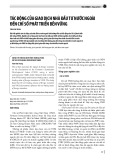
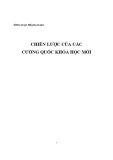
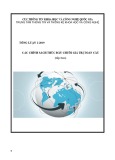

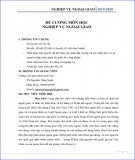
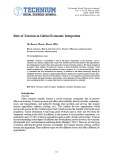

![Giáo trình Kinh tế quản lý [Chuẩn Nhất/Tốt Nhất/Chi Tiết]](https://cdn.tailieu.vn/images/document/thumbnail/2026/20260122/lionelmessi01/135x160/91721769078167.jpg)











![Bài giảng Kinh tế vĩ mô: Tổng cung – tổng cầu của nền kinh tế và các chính sách kinh tế vĩ mô [chi tiết]](https://cdn.tailieu.vn/images/document/thumbnail/2025/20250903/oursky04/135x160/32461768808266.jpg)

![Bài tập Kinh tế học đại cương [kèm lời giải/ đáp án/ chi tiết]](https://cdn.tailieu.vn/images/document/thumbnail/2025/20250115/sanhobien01/135x160/59331768473355.jpg)
